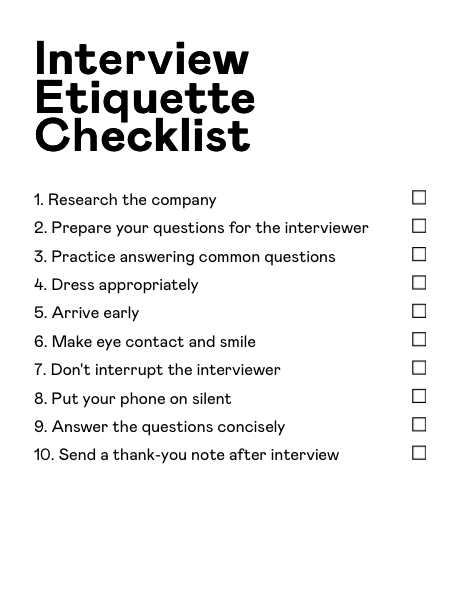Top Interview Etiquette Rules
Impress potential employers and increase your chances of getting hired.

Image: https://unsplash.com/photos/person-standing-near-the-stairs-MYbhN8KaaEc
It is not enough to give correctly answers from a recruiter to get hired. It is also important to impress an employer. Experts say that 55% of first impressions are made of what we see, and 38% of it is made by our voice.
Brushing up on the conference etiquette is a sure way to strengthen the first impression and increase your chances for a position. Below, we've gathered the top meeting etiquette tips to get you fully prepared.
Are your CV and LinkedIn profile ready for an employment search? Our experts can assist in preparing your CV, cover letter, and LinkedIn profile for an effective profession search and ensure that you impress a recruiter online. Send us your profile for a free review today!
Preparation tips for your job conference success

Do your research
Not researching the company is one of the biggest mistakes of candidates. Hiring managers believe that it demonstrates your low interest in the position or lack of research skills. Moreover, it is a sign of poor etiquette. The future employer is likely to ask what you know about the company or why you want to work with them, and awkward silence as a response won't aid you stand out.
Plus, after doing an interrogation research you'll know if the company is a good fit for you and whether you'll be comfortable working there.
Practice answering common questions
You can find common conference questions online or read our guide to effectively prepare for a vocation meeting. Practicing to answer them will assist you to feel confident during the actual conversation as you'll know what to expect.
To answer behavioral interrogation questions, recall your past accomplishments, and transferable skills, and think about how to demonstrate them with examples. Use the STAR method when depicting your experience and projects.
Prepare your questions to ask
All HR managers expect you to ask something at the end of the job meeting. So, prepare a few questions about the company culture, responsibilities, and how they measure success. Thus, you will make an impression as an eager, interested professional. If you're not sure what to ask, read our list of top 29 interview questions to ask.
Basic interview etiquette
To impress the recruiter during the job interrogation, follow these recommendations:
Dress appropriately
Wearing appropriate attire helps you to make a great first impression. Moreover, dressing professionally illustrates your knowledge of business etiquette. Dress up for the conference considering industry norms and the company's dress code. For example, if they have a casual dress code, you'll want to dress smart casual to be slightly overdressed and demonstrate respect.
Arrive early
Being late is one of the worst interrogation sins. If you have an in-person meeting, it's best to leave earlier than usual. It is better to wait for 20 minutes in a coffee shop near the office if you arrive early to the interview location than to run late and make excuses on the go.
If you have a Zoom conference scheduled, join 10 minutes early so that you have time to concentrate and troubleshoot any minor issues.
Watch your body language
Nonverbal cues and body language illkustrate your enthusiasm, how confident you are, and your meeting etiquette skills. Here is what to keep in mind:
- Maintain eye contact - 68% of recruiters believe that not making eye contact is the biggest interrogation mistake. Making eye contact illustrates that you listen carefully, and are interested and engaged in a conversation.
- Keep a straight posture - a bad posture can signal that you are bored or lack confidence. On the contrary, a straight posture conveys enthusiasm, energy, and leadership. Practice in front of the mirror if you need to.
- Make hand gestures - it is okay to use gestures to state your point, but do not go overboard with it.
- Avoid crossed arms and legs - it is a sign that you feel uncomfortable or defensive.
- Speak loudly so that the interviewer can hear you, but not too fast. Avoid filler words.
Start strong
For most employers, the first 30 seconds of the conference are enough to impress. So, it is important to start strong. Enter the office with confidence, give the interrogator (or multiple interviewers) a firm handshake, and start a small talk. You can mention something interesting you've noticed in the company's office or read on their website. You need to convey confidence and enthusiasm to impress.
Smile
Meetings are stressful, yet, you do not want to look nervous and stressed during the entire conference. Smiling will help you look friendly and approachable even if you do not feel it at the moment. Plus, if you approach the conversation with a positive attitude, it will help you relax and demonstrate your best.
Don't interrupt
Answer after the interrogator is done speaking. Don't interrupt them even if you have an impression that you know what they're going to ask. It is rude and shows poor business etiquette. Wait for them to pause and then reply. You can ask for clarification if you're not quite sure what the interlocutor has in mind.
If you want to bring up something important, do it closer to the end of the interrogation. You might want to explain why you're changing industries or tell about the volunteering project that helped boost your leadership skills. If you believe that this detail can be a game-changer, tell them about it.
Be concise
In-person meeting time is limited, so you do not want to overload the conference with too much detail. Keep your answers short and to the point. Ideally, you should answer each question in 5-7 sentences.
Be sure to manifest enthusiasm and excitement. When speaking about your significant achievement or what you enjoy most about your role, showing positive emotions will increase your likability. They will demonstrate the employer that you are enthusiastic about your job and make a great addition to their team.
Put your phone on silent
Most people forget about it, but a phone ringing or beeping during the interrogation can be super distracting. Plus, answering the phone in the middle of the conference instantly shows poor etiquette. Make sure to put your phone on silent so that nothing disturbs you during the important interview.
Send a thank-you note
Not every job-seeker sends a follow-up note after the meeting, so this is your chance to stand out. Write a thank-you letter expressing gratitude for the conversation and enthusiasm about joining the company. Keep it short - a few sentences are usually enough. The person interrogating you will surely appreciate it.
You can send another email in a week to ask about the progress of the hiring process if you haven't heard from them.
What not to do during the job interview?
These common conference mistakes show your bad manners and inevitably spoil the first impression:
- Do not touch your face, or hair, or hold a pen in your hand - these body language cues show that you are nervous and insecure.
- Do not interrupt the interview to take a phone call - it shows that you don't value the interrogator's time.
- Do not talk too much - no need to speak about every single successful project, focus on the most relevant and important facts.
- Do not speak about salary too early - it shows that you have no other motivation for joining the company other than money.
- Do not appear too casual - wearing informal clothes, talking to an interlocutor as you talk to your friends, and lounging on the sofa make an unprofessional impression.
Illustrating good interrogation etiquette can help you stand out if the hiring manager is choosing between you and another candidate with similar hard skills. Moreover, good etiquette manifests that you respect time and boundaries of others, and can communicate with coworkers and clients effectively, which will add you points. Remember to show enthusiasm and excitement about the position, and well as your motivation for joining the team.
Recommended reading:
- Top Interrogation Questions All Hiring Managers Ask
- 10 Things to Change in Your CV to Get More Interviews
- What To Wear For An Interview Female: Your 2024 Guide
Author: Editorial Team at ResumePerk.com
Reviewed by: Certified Career Expert
Last updated: December 2025


